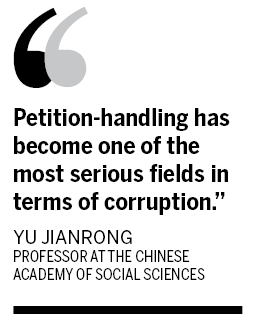

A high-ranking official in charge of handling public complaints is under investigation for "serious violations of laws and discipline", adding to the expanding number of officials scrutinized in the government's recent crackdown on corruption.
Xu Jie, 58, deputy director of the State Bureau for Letters and Calls, is the subject of a probe, the Central Commission for Discipline Inspection of the Communist Party of China said on its website on Thursday.

Xu, who has spent most of his career in the complaint-handling field, was appointed the bureau's deputy head in 2005.
The bureau was established in 2000 and is responsible for receiving petitioners, transferring complaints to the central government's departments or local authorities and assisting in the handling of mass incidents.
Although the government's disciplinary watchdog did not detail what was behind Xu's probe, some experts said it is likely he was connected to local officials who wanted to conceal negative comments that would reflect badly on their jurisdictions.
"Petition-handling has become one of the most serious fields in terms of corruption," Yu Jianrong, a professor at the Chinese Academy of Social Sciences, wrote on his micro blog.
"Some local officials have to bribe their peers at petition-handling departments to reduce the number of petitioners recorded in the computer system."
According to a State Council regulation issued in 2005, a government employee's performance record will be negatively affected if he or she fails to properly handle a petition or complaint from a member of the public.
But the regulation runs up against a common practice in which rewards are tied to documented work performance. In many jurisdictions, rewards are based on criteria that include a low level of complaints. A government entity could be disqualified, for example, if it had too many complaints.
Consequently, some local officials have placed heavy emphasis on preventing petitioners from appealing to higher authorities to voice their grievances, thereby reducing the overall number of petitioners recorded by departments such as the State Bureau for Letters and Calls, according to Yu.
The investigation of Xu added one more high-ranking official to a list of more than 10 others being probed by disciplinary inspectors after the Party's new leadership took office in November 2012.
Before Xu, the most recent target of the anti-corruption campaign was Guo Youming, vice-governor of Hubei province, who was also suspected of "serious discipline violations". On Wednesday, the CPC Central Commission for Discipline Inspection confirmed on its website that an investigation of Guo is underway.
Guo's profile on the Hubei government website describes him as being in charge of the province's land and resource management, its agriculture and a project to divert water from China's flood-prone south to its arid north, among other responsibilities.
Lin Zhe, a law professor at the Party School of the CPC Central Committee, said, "It is understandable that so many senior officials have been nailed for corruption or other misconduct because top leadership is exerting unprecedented strength into the fight."
However, the ultimate solution, Lin said, is to enact a law requiring officials to publicly declare their assets.
In addition, according to He Zengke, a researcher at the Central Compilation and Translation Bureau, personnel and budget-management mechanisms need to be reformed so that systemic loopholes that promote corruption can be closed once and for all.